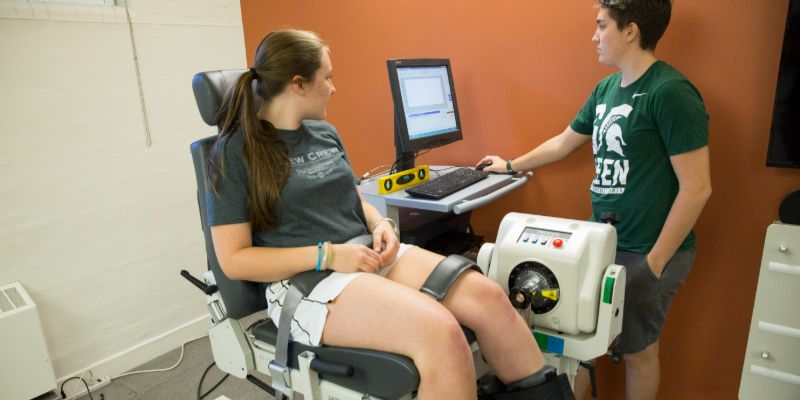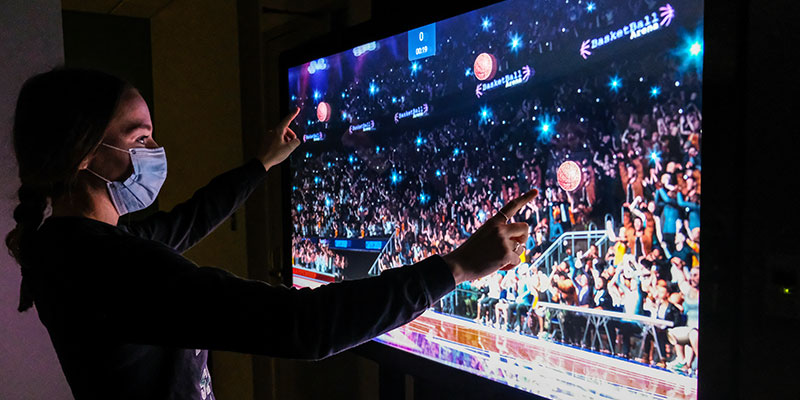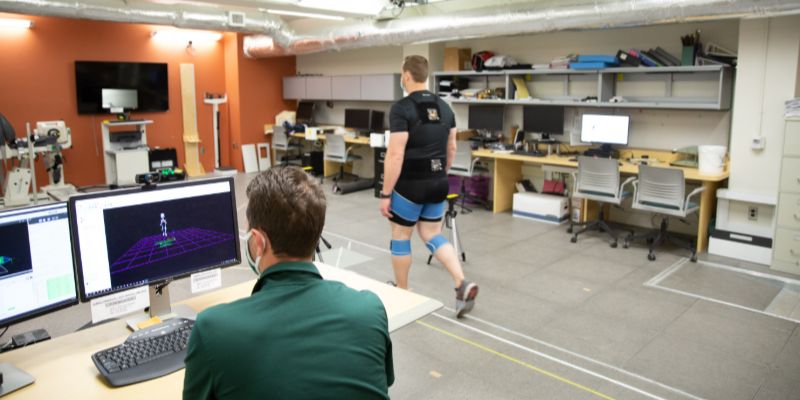Return to Sport testing in the Air Labs
Assessments are available from the Athletic Injury and Rehabilitation Laboratories at Michigan State University starting 4 months after ACL reconstruction and at the surgeon’s discretion following patellofemoral surgeries. These assessments are part of two ongoing research studies (00002816 and 17-1512) and all participants are asked to provide consent prior to participation. Participation is voluntary. Results of your testing session will be communicated to your surgeon via written report within 24 hours of testing so that they may assist with the management of you or your child’s rehabilitation and return to sport clearance process. Testing visits may include the following depending on the amount of time that has passed since injury or surgery:
- General health and knee health screening
- Assessment of thigh muscle strength
- Single leg hopping and jump landing assessment
- 3-dimensional motion analysis
- Knee joint cartilage imaging using ultrasound
Assessments last roughly 1 hour and follow-up assessments during the first 2 years following injury or surgery are available at the discretion of the patient and the treating surgeon.
Potential Risks
The team associated with this study has significant experience with the techniques and tools that will be utilized in this project. All included testing methods have been safely utilized by the study team to evaluate over 250 patients with and without knee injury. Minimal risk is limited to muscle soreness following strength and hop testing which may last up to 48 hours after the initial study visit. Another risk includes falling during one of the functional tasks such as hopping or landing. This may result in orthopedic injury or possible damage to a reconstructed knee which may result in additional medical care and/or surgeries which may add to the cost to insurance or to the patient. The study team will attempt to minimize this risk in several ways including providing clear instructions and demonstrations prior to the start of data collection, allowing supervised practice of all tests prior to recording performance, and discontinuing any tests that result in significant changes in pain or perceived knee stability during the testing procedures.
Scheduling Appointments
To schedule an assessment, contact the laboratory directly at your earliest convenience. Parking for visitors to the Sports Injury Research Laboratory is available in lot 62W which is located on the north side of Spartan Stadium. Please contact us via email or phone in advance of your visit to obtain the necessary information to park free of charge.
Want to Know More?

The Athletic Injury and Rehabilitation Laboratories
The Athletic Injury and Rehabilitation Laboratories is a collaborative sports medicine research laboratory in the Department of Kinesiology on the campus of Michigan State University. The SIRL is co-directed by Dr. Tracey Covassin, Dr. Nicole Hoffman and Dr. Matthew Harkey with the assistance of graduate and undergraduate students.

Concussion Research
The concussion research group focuses on investigating the neurocognitive, sensorimotor, and psychological effects of concussion, along with variables that affect recovery following concussion in youth and collegiate populations. In addition, the concussion research group assesses optimal methods for the development and implementation of coach, parent, and athlete education on the topic of sport-related concussion.

Knee Injury Research
The knee injury research group focuses on collaborative research with the Department of Orthopedics investigating the effect of knee joint injury on physical activity characteristics, neuromuscular function, and knee joint cartilage health among individuals with a history of knee injury. The aim of this research is to identify individuals at elevated risk for poor knee-related and health-related outcomes following knee injury utilizing innovative assessment techniques while facilitating a timely and safe return to physical activity.
